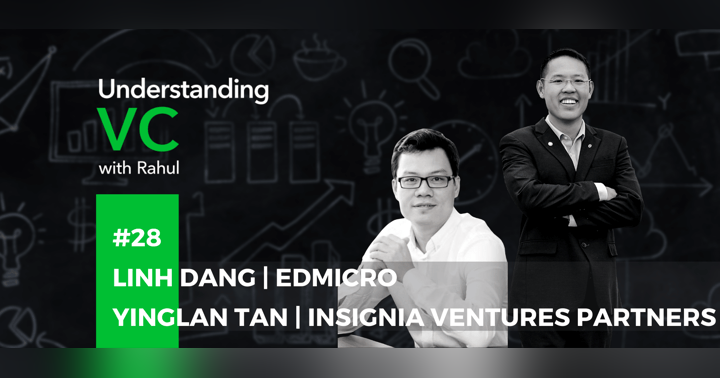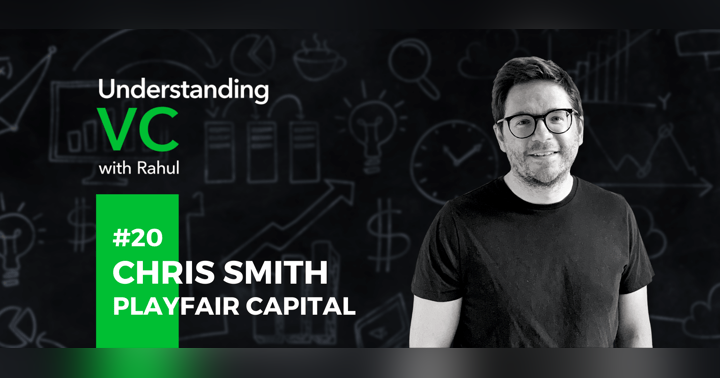Understanding VC: #17 Binh Tran’s founding story of Klout, his investment in Axie Infinity, and the importance of personalizing your storytelling process for founders

In the latest episode of Understanding VC, we had a conversation with Binh Tran, co-founder and General Partner at Ascend Vietnam Ventures, a seed stage venture capital firm focused on the emerging Vietnamese startup ecosystem. We delved into Binh’s career trajectory which originated from an intensive interest in software development, mapping a magnificent path for him which led him to become a successful entrepreneur and an astute investor.
Binh explained to us the emergence of the Vietnam startup ecosystem which has continued to flourish throughout the last decade, and illustrates a promising future. He enumerated some of the principles which, in his opinion, are indispensable for entrepreneurs. We were also fortunate enough to learn from him the founding story of Klout, which became a global phenomenon, and his investment experience with Axie Infinity, currently the world’s most successful blockchain game.
Binh loved software building because of the unique fusion of science, maths, and creativity that it embodies. He started to learn coding during his formative years which fueled his interest even further. It doesn’t come as a surprise that he grew up to be the co-founder of a company as successful as Klout in 2008, which he refers to as “a google for people”. Klout was a global phenomenon which democratized the power of content, allowing people to build a Klout Score between 1-100 based on their online influence. Klout was the brainchild of Binh’s co-founder, Joe Fernandez. Binh was promptly attracted by the idea, “within 30 seconds I said, let’s do it.” And the rest is history. Binh and Joe realized the power of online content creation quite early on, while it is an arena still being experimented with in 2021.
This startup worked out so well for primarily two reasons: the co-founders had already built a foundation of trust by previously building two startups together, and most probably due to this strong foothold, they were able to garner forty investors in the seed round.
After Klout’s acquisition in 2014, Binh started travelling and soon he met Eddie Thai who became a catalyst for Binh’s growth as an investor. Binh had been an angel investor for a couple of years at that point, but he had not considered being an investor for a living. Eddie familiarized Binh with the potential he had identified in the Vietnam market, and together they went on to establish 500 Startups Vietnam.
In Binh’s opinion, education was a key element in pioneering the Vietnam startup ecosystem. The market was just starting to emerge around that time and a great deal needed to be done to give it a nudge in the right direction. The sheer amount of effort that Binh and Eddie had to put into 500 Startups as investors, revealed something unforeseeable to Binh, “Before being a venture capitalist I had the wrong notion of investors sitting on a beach sipping Mai Tais…I had no idea how much work this was going to be.”
Nevertheless, the hard work was justified as well as rewarded. Venturing into a new market just as it had started to take off required a keen sense of timing, which Binh had gotten right. According to him, the Vietnam market, in addition to Southeast Asia as a whole, is a breeding ground for diversity and talent unprecedented by even the European markets. And in the early stages, the ecosystem is certainly more adaptive and reprogrammable which worked to Binh’s liking.
Southeast Asia represents a truly accessible market.
As our conversation about the Southeast Asian ecosystem progressed, Binh revealed to us something that sets Vietnam and Singapore apart. In these two countries, foreigners are allowed a hundred per cent ownership of local entities, which makes them a magnet for talent as well as capital. Although at the same time, it becomes important to build local teams to really understand and adapt to a country’s culture in order to find the best ways to serve customers.
In 2015, Binh got the chance to indulge in his previous interests again. Previously, Binh had been involved in the development of PlayStation 1 and Nintendo 64 games, where he inserted himself as a villager inside the gameworld, potentially becoming the first Vietnamese game character. Almost a decade later, he was amongst the first investors who put money into Axie Infinity which has evolved to become the most successful blockchain game in the world. As of May 2021, it is the number one NFT on the planet, and it continues to grow at a steady pace with a promise of crossing the $1 billion mark by the end of this year.
We talked a little more about the possibilities that Axie Infinity’s success reveals about the Vietnam startup ecosystem. “Axie represents a validation of our thesis, that there is a wave of iconic companies coming out of Vietnam, and a lot of that is due to the accessibility and software talent here,” Binh claimed. He also told us a bit about Axie Infinity’s founder, Trung Nguyen, a software engineer who never went to a foreign university, and yet managed to achieve such a feat just because of his ideas, skills and talent.
Binh came across Trung in 2018 when Axie Infinity had under four hundred users, but even this small customer base was extremely satisfied and thus, loyal to the product. A combination of promising early-traction and an impressive team sealed the deal for Binh.
We wanted to know more about Ascend Vietnam Ventures’ mechanism, and the ways in which it aims to support startups and entrepreneurs; Binh was ready with some cogent answers. But first, he posed an interesting question, “You as a founder are hiring people who are smarter than you…how are you going to lead and empower them?” This is where experience and education comes in, and Ascend Vietnam Ventures’ goal is to empower the founders by lending them these tools in addition to capital.
The most exceptional talent out there…they are starting their own companies because they can’t find companies that can really fit them.
Binh pointed out that culture building and expansion are integral tasks which are often overlooked in the process of building a company. The employees, investors as well as customers are best retained when those people relate and want to be connected with the culture that your company propagates. Culture-building should be taken up at the very beginning because it is a gradual process, and takes constant time and effort. As Binh indicated, “Foundational pieces live on well-beyond the seed-round…that can set you on a very very different trajectory.”
Culture-building starts right when a founder is pitching his idea to the investor. And that starting point is crucial. There’s something that could tip the scales in your favour at this juncture: storytelling. “You need to build a mastery in storytelling, and understand who you’re telling that story to,” Binh said. From his perspective, the story you tell your investors should be different from the story your customers are hearing from you, and likewise, the employees should get a different story altogether. Here, by using the word ‘different’, Binh intends to underline the importance of personalizing your storytelling process. Of course, the interests of the aforementioned three parties are different, and the founders need to adapt to that proficiently.
An interesting question came up during this part of the conversation: is fudging the numbers during early fundraising a viable technique? A lot of founders seem to use it and get away with it, does that illustrate its utility? Binh’s answer wasn’t entirely unexpected, “It’s not that investors don’t notice it but they are willing to tolerate it.” Here, he again underscored the value of trust-building in the early stages of a company which would certainly go a much longer way than false promises based on fudging of numbers. “Fundraising sucks but if you find the right fit, put a hundred per cent of your time into it because capital can be an enormous advantage,” he added.
Towards the end of the episode, we learned that Binh is quite excited about the generational companies coming out of Vietnam and looks forward to participating in the Vietnamese market even more effusively.



